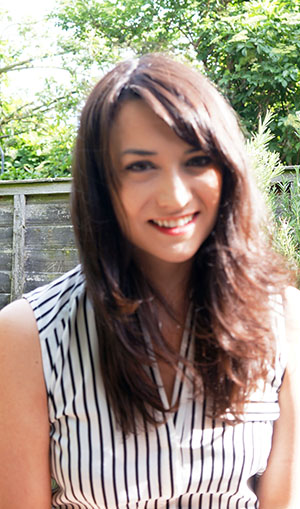Claire Gillan, 26, Psychology
When you repeat something so often that it becomes automatic, it’s a learned habit.
“This is a really important skill that our brains allow us to have,” Claire Gillan says. “It means we can multitask, thinking about what we’ll have for dinner while we are driving home. It means we don’t need to spend an hour tying our shoelaces every morning.”
(Photo: Claire Gillan)

But sometimes habits run amok. Sometimes the neural wiring that’s supposed to help us go about our mundane chores gets tweaked. “In some psychiatric disorders,” Gillan says, “over-active habit learning can make people unable to stop doing things that no longer make any sense, like in obsessive-compulsive disorder.”
Gillan, fresh off her Cambridge Ph.D. in experimental psychology, is now at New York University on a prestigious Sir Henry Wellcome postdoctoral fellowship, to study how and why that overactive wiring sometimes takes over. She uses behavioral experiments, neuroimaging, and other methods to understand what’s going on when normal habits morph into disruptive compulsions.
Originally from Sligo, a county on Ireland’s west coast, Gillan started out wanting to be a clinical psychologist. “I’m not sure why, but I had a lot of conviction about it,” she says. “The brain always fascinated me. I thought it was a really exciting thing to try and understand, and I thought if I could use that knowledge to help people, that would make for a really satisfying job.”
A decade later, with her psychology bachelor’s degree in hand (from University College Dublin), she realized how little we know about the brain. Academia beckoned: “I could chase ideas, find new answers, and potentially make a contribution that would have some permanence.” Writing her thesis cemented her love of research.
Her work was featured on two BBC documentaries about obsessive-compulsive disorder, and she gave talks about OCD everywhere from Yale to Harvard to specialized conferences to support groups. She also co-founded Cambridge’s Pint of Science festival, which mixes top academics, the general public, and pub-served beer. It’s an event she’s planning to bring to New York City in the near future.
In the meantime, Gillan is busy producing original research that sheds light on how to better understand psychiatric disorders. “I would like to have helped overhaul the practice of psychiatry,” she says. “The system is broken. There is a one-size-fits-all approach to treatment and it just doesn’t work. My goal is to use evidence-based research to guide a new treatment approach that moves away from the flawed classification system. Not everyone fits into one of those boxes ascribed by the DSM—in fact, most people don’t.” Instead, Gillan wants to usher us into an era of treatments that are tailored to each individual.
“There are a lot of things we don’t know about the universe,” Gillan says, “but for some reason I think that the brain is the most exciting puzzle of them all. We will never solve it, of course, never figure out fully what is going on up there. But we can make inroads, and that really drives me.”
See our complete 2014 list of the 30 top thinkers under 30 here.





